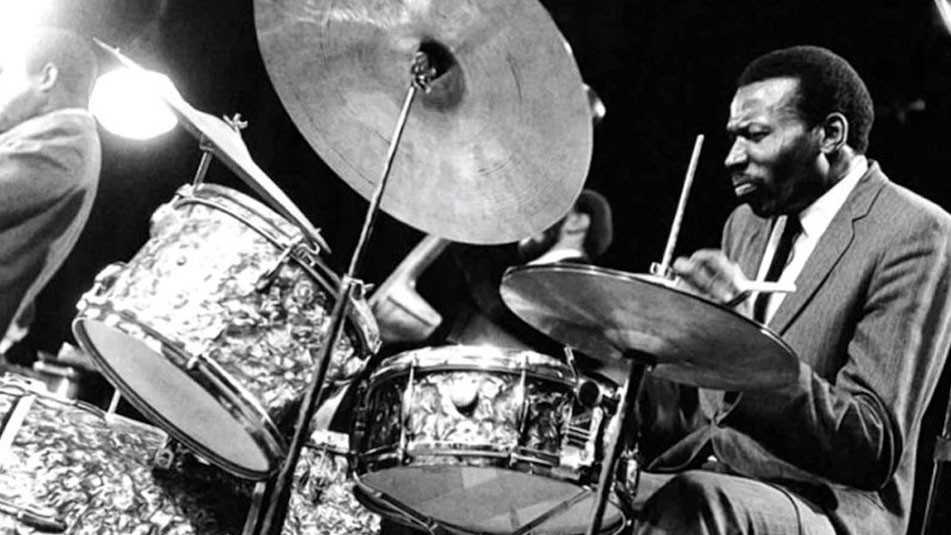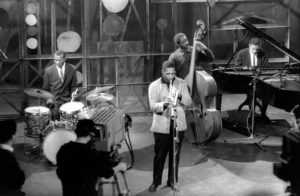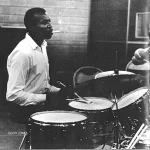Artists
Elvin Jones and The Evolution of Jazz Drumming

Elvin Jones was more than just a drummer. He was a transformative force in jazz music. Renowned for his powerful, poly-rhythmic style, Jones elevated the role of the drummer from a timekeeper to a vital, interactive voice in the ensemble. Most famously known for his work with John Coltrane’s legendary quartet, his innovations in rhythm and his spiritual approach to music left an indelible mark on jazz. Through his thunderous rolls and intricate patterns, Jones redefined the possibilities of drumming, blending African rhythms with jazz improvisation in ways that still inspire musicians today.
Let’s have a comprehensive look at his life and career:
Childhood
Elvin Ray Jones was born on September 9, 1927, in Pontiac, Michigan, US. He was the youngest of ten children in a musical family. His brothers, Thad and Hank Jones, also became prominent jazz musicians, with Thad excelling as a trumpeter and Hank as a pianist.
Growing up in Pontiac, Michigan, Elvin was surrounded by music. His early exposure to rhythm and melody was primarily influenced by his brothers. As a child, he was fascinated by the military bands and drummers he saw in parades, which sparked his interest in drumming.
He began learning drums at a young age, although he was largely self-taught. His father, Henry, was a lumber inspector, while his mother, Olivia, was a homemaker. Music, particularly jazz, was always present in the household, with family jam sessions that inspired his passion.
Career

Jones’ big break came in 1960 when he joined John Coltrane’s Quartet, which became one of the most influential groups in the history of jazz. Alongside Coltrane, pianist McCoy Tyner, and bassist Jimmy Garrison, Elvin’s drumming contributed to some of the most iconic recordings in jazz, including:
- “A Love Supreme” (1965)
- “My Favorite Things” (1961)
- “Impressions” (1963)
His most famous period was his tenure with Coltrane (1960–1966), during which his innovative drumming style took center stage in jazz, transforming the rhythm section from mere accompaniment to a driving, interactive force.
After leaving Coltrane, Elvin led his own groups and continued recording prolifically, collaborating with a wide range of musicians, from Wayne Shorter and Freddie Hubbard to Charles Mingus. His bands, known as Elvin Jones Jazz Machine, often featured young talents, helping them develop their own careers.
Drumming Style
Elvin Jones’ drumming style is known for its polyrhythmic complexity and sheer power. He was one of the earliest drummers to take full advantage of the drum kit as a multi-faceted instrument, using all parts of it to create an intricate web of rhythm. His use of triplets and an Afro-centric approach to rhythm were revolutionary.
Jones’ playing was highly interactive, constantly responding to and pushing the other musicians. His drumming had a rolling, thunderous quality, often described as “cascading,” creating waves of sound that pushed the music forward. He was particularly noted for his ability to “converse” musically, creating dialogues with soloists, especially with Coltrane’s saxophone.
Influences

Coltrane’s modal jazz innovations also deeply impacted Elvin’s playing. His spiritual approach to music, inspired by Coltrane’s vision, led to a more exploratory and meditative form of drumming, blending improvisation and structure seamlessly.
Death
Elvin Jones continued to perform and record well into his 70s, despite health issues. On May 18, 2004, he passed away from heart failure at age 76. Even in his final performances, Jones played with the same intensity and passion that marked his career.
Legacy
Elvin Jones’ contributions to jazz drumming are immeasurable. He redefined the role of the drummer in jazz, turning it from a background role to an essential, creative part of the music. His collaborations with Coltrane remain some of the most important in jazz history, inspiring generations of musicians.
Many drummers, including Tony Williams, Jack DeJohnette, and Billy Cobham, cite Elvin as a major influence. His rhythmic innovations and powerful style helped to shape the future of jazz, fusion, and modern drumming.
Elvin Jones is remembered as a master of his craft, someone who pushed the boundaries of rhythm and whose playing was deeply connected to emotion, spirituality, and intensity.
Here are a few video highlights of Elvin Jones
Elvin Jones, Max Roach, and Art Blakey drum battle
Drum Solo 1978
John Coltrane Quartet – My Favorite Things (1965)
Elvin Jones: Jazz Machine 1991
The Genius of Elvin Jones by Drumeo
The Grooves of Elvin Jones by Drumeo
Elvin Jones was not only a master drummer but also a visionary who expanded the very language of jazz. His powerful, rolling rhythms and pioneering use of poly-rhythms set a new standard for jazz drumming, turning the drum kit into an expressive, central voice rather than a background instrument. Through his work with John Coltrane and his own ensembles, Jones influenced generations of musicians and redefined what it meant to be a jazz drummer. His legacy lives on, both in the timeless recordings he left behind and in the countless drummers who continue to be inspired by his fearless, innovative spirit. Elvin Jones will forever be remembered as a transformative figure who truly understood the power of rhythm to shape, elevate, and deepen music.

